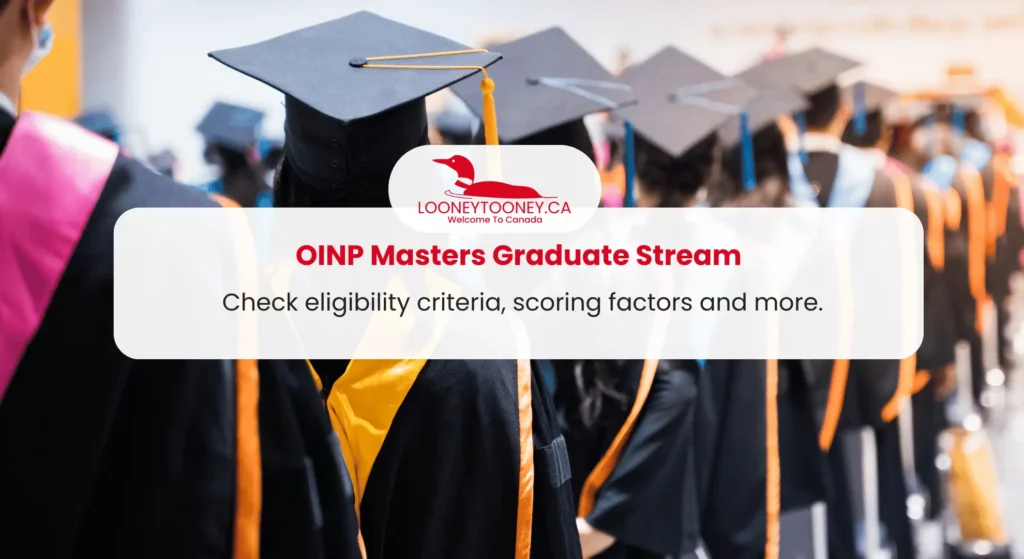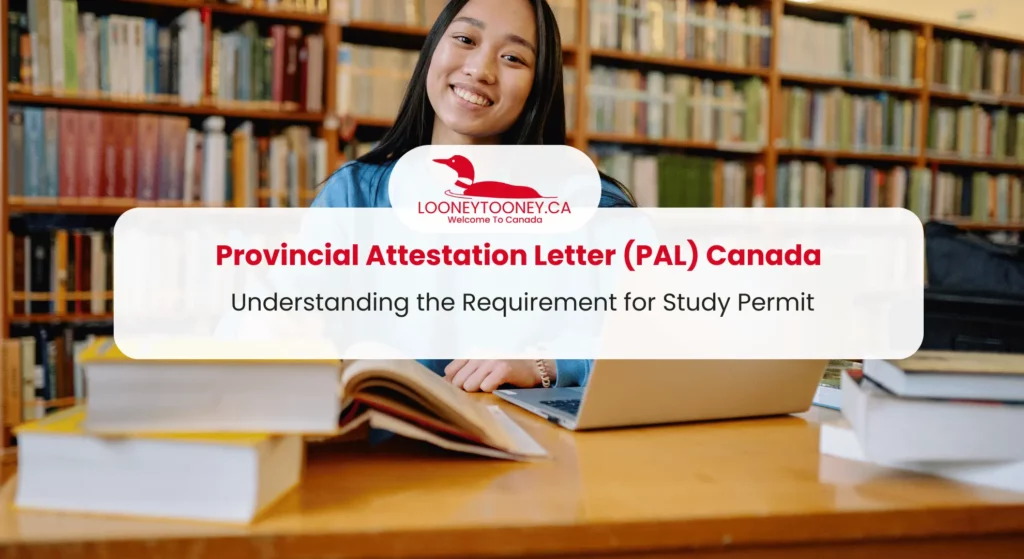The OINP Master’s Graduate stream is an immigration pathway by the Ontario Immigrant Nominee Program. It offers international graduates who hold a master’s degree from an Ontario university the chance to permanently live and work in Ontario. This stream recognizes the valuable contributions that individuals with advanced education can make to the province’s workforce and communities. Let us get into the details of this stream in this article.
Table of Contents
- Documents Required for OINP Masters Graduate Stream
- Eligible Universities for OINP Masters Graduate Stream
- Requirements for OINP Masters Graduate Stream
- FAQs for OINP Masters Graduate Stream
Documents Required for OINP Masters Graduate Stream
Before applying online for nomination by the Ontario government for permanent residence, you need to register in the OINP’s Expression of Interest System and wait to receive an invitation to apply.
Applicants to the Master’s Graduate Stream of the Ontario Immigrant Nominee Program (OINP) are required to scan and upload copies of the following essential documents when submitting their application:
- Applicant consent form
- Identity documents
- Status documents in Canada
- Residency documents for Ontario
- Education credentials
- Language proficiency test results
- Documentation confirming compliance with settlement fund requirements
- Curriculum vitae (resume)
- Expression of interest selection factors
- Any other relevant optional documents (if applicable)
Eligible Universities for OINP Masters Graduate Stream
To be eligible for the Master’s Graduate stream, your master’s degree should be from one of the following accredited Ontario universities:
- Algoma University
- Brock University
- University of Waterloo
- Carleton University
- Lakehead University
- Laurentian University
- University of Toronto
- McMaster University
- Nipissing University
- Ontario College of Art & Design University
- University of Ontario Institute of Technology
- Queen’s University
- Royal Military College of Canada
- University of Ottawa
- Toronto Metropolitan University (formerly Ryerson University)
- Trent University
- University of Guelph
- University of Windsor
- Western University
- Wilfrid Laurier University
- York University
Requirements for OINP Masters Graduate Stream
The applicant must fulfill the following OINP Masters Graduate stream requirements to be qualified:
OINP Masters Graduate Stream Requirements
Upon receiving an invitation to apply, candidates are eligible to apply for the master’s Graduate stream of the Ontario Immigrant Nominee Program (OINP). To ensure approval, applicants must meet the following requirements outlined below. Notably, a job offer is not required for application.
1. Invitation to Apply
Applicants must have received an invitation to apply and submitted their application within the specified deadline. It is essential to demonstrate that the qualifications claimed in the expression of interest registered with the OINP are accurate.
2. Education
Eligibility includes completing the requirements for obtaining a master’s degree. This includes at least one academic year of full-time study or its equivalent in part-time studies from an eligible university in Ontario. Exceptions may apply for individuals enrolled as students, provided they meet specific criteria.
3. Language Proficiency
Applicants must have proficiency in either English or French at a Canadian Language Benchmark (CLB) level 7 or higher. This requirement necessitates taking an approved language test before applying, with the test date not exceeding two years from the application submission date.
4. Residency in Ontario
Candidates must have legally resided in Ontario for at least one year within the past two years preceding the application. The residency period can be cumulative, allowing for gaps provided they amount to 12 months within the two-year timeframe.
5. Settlement Funds
Sufficient funds to support oneself and dependents upon settling in Canada are mandatory. These funds can be demonstrated through various means, including bank statements, annual earnings from employment in Ontario, or a job offer in Ontario.
6. Intention to Live in Ontario
Applicants must demonstrate a genuine intention to reside in Ontario post-permanent residency. Factors such as employment history, job offers, education, property ownership, and personal relationships in Ontario contribute to proving this intention.
7. Residency at Time of Application
At the time of application submission, candidates must either be living in Ontario with legal status or residing outside of Canada. Applicants residing in provinces or territories other than Ontario at the time of application are ineligible.
8. Legal Status in Canada (if applicable)
Candidates applying from within Canada are required to possess legal status (such as a visitor record, study permit, or work permit) at the time of application and must maintain this status until the nomination process is completed. ‘Implied status’ may apply to those awaiting a decision on their IRCC application.
9. Application Period
Applications must be submitted within two years of completing the requirements necessary to obtain the master’s degree. The application submission date is based on the degree date or the official letter from the university stating the degree’s expected grant date.
These requirements ensure that candidates are well-prepared to start on the journey toward successful permanent residency in the Ontario community.
Scoring Factors for OINP Masters Graduate Stream
After registering an expression of interest under this stream, you will get scores on the following factors. These factors also work as the OINP Masters Graduate Stream score calculator.
Upon receiving an invitation to apply, you need to provide particular documents corresponding to each factor where you earned points. It’s important to note that scoring factors differ from stream criteria. You must satisfy all criteria for this stream and include the mandatory documents with your application.
Work Permit Status
- With a valid work permit: 10 points
- Without a valid work permit: 0 points
Earnings in Canada in a Year
Taken from a Notice of Assessment provided by the Canada Revenue Agency within the past five years.
- More than or equal to CAD 40,000: 3 points
- Less than CAD 40,000: 0 points
Highest Level of Education
Canadian credential or Educational Credential Assessment required.
- PhD: 10 points
- Masters: 8 points
- Bachelors or equivalent: 6 points
- Graduate diploma or certificate: 6 points
- Undergraduate diploma or certificate: 5 points
- Apprenticeship or Diploma or Trades Certificate: 5 points
- College diploma or trade certificate: 5 points
- Only high school (less than college or trade certificate): 0 points
Field of Study
The field of study must be from the following
- STEM/Health and Trades (agriculture and natural resources operations and management, mechanics and repair, architecture, construction and precision production): 12 points
- Social work and related programs, education, personal, business and administration, behavioural science, security and transport services, legal: 6 points
- Arts and humanities, business, humanities, arts, social science and education, programs and programs that are not elsewhere classified: 0 points
Canadian Education Experience
The credential you submit must be from a Canadian college or university and should require at least one year of full-time study to complete.
- More than one Canadian credential: 10 points
- One Canadian credential: 5 points
Language
The language proficiency is checked in the following way for OINP Masters Graduate Stream
| CLB | Points |
| 9 or higher in official language | 10 |
| 8 in official language | 6 |
| 7 in official language | 4 |
| 6 or lower in official language | 0 |
| Number of Official Languages Known | Points |
| 2 | 10 |
| 1 | 5 |
Location of Study
- Northern Ontario: 10 points
- Other areas outside the Greater Toronto Area (excluding Northern Ontario): 8 points
- Inside GTA (except Toronto): 3 points
- Toronto: 0 points
- Credential was completed without physically attending (in-person) classes: 0 points
As we’ve explored in detail, the stream offers a structured process for eligible candidates to pursue permanent residency in Ontario. From understanding the required documents to meeting specific criteria such as education, language proficiency, and residency, applicants are guided through each step with clarity and transparency. Furthermore, the scoring factors outlined provide a comprehensive overview of how candidates are evaluated, ensuring fairness and consistency in the selection process.
FAQs for OINP Masters Graduate Stream
1. What is OINP Masters Graduate Stream?
A. The OINP Masters Graduate Stream is a pathway within the Ontario Immigrant Nominee Program designed to facilitate the permanent residency of international graduates holding a master’s degree from an Ontario university.
2. What are the documents required for the OINP Masters Graduate Stream application process?
A. Applicants are required to upload scanned copies of various documents, including identity documents, residency proofs, educational credentials, language proficiency test results, and documentation verifying compliance with settlement fund requirements.
3. Which universities are eligible for the OINP Masters Graduate Stream?
A. To qualify for this stream, the master’s degree must be obtained from one of the accredited Ontario universities listed in the eligibility criteria.
4. What are the key requirements applicants must meet for OINP Masters Graduate Stream eligibility?
A. Applicants must meet various criteria, including possessing proficiency in English or French, demonstrating residency in Ontario, having the intention to reside in Ontario post-permanent residency, and submitting the application within the specified timeframe.
5. How are applicants scored under the OINP Masters Graduate Stream?
A. Upon registering an expression of interest, applicants receive points based on factors such as work permit status, earnings in Canada, highest level of education, field of study, Canadian education experience, language proficiency, and location of study. These points contribute to determining eligibility for the stream.





